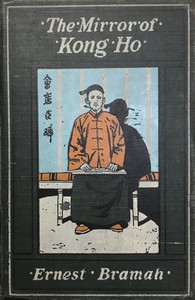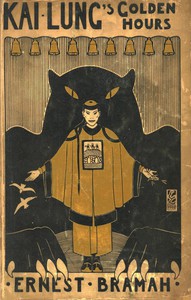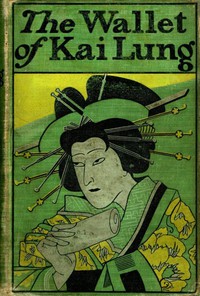The Mirror of Kong Ho by Ernest Bramah (big screen ebook reader .TXT) 📗

- Author: Ernest Bramah
Book online «The Mirror of Kong Ho by Ernest Bramah (big screen ebook reader .TXT) 📗». Author Ernest Bramah
Nevertheless it is not to be questioned that the system of the versatile Wei Chung was, in itself, grounded upon a far-seeing accuracy, and as the need of such a rational observation is deepened among the inconsistencies and fantastic customs of a barbarian race, I have made it a useful habit to accept as a guide for the day’s behaviour the reflections engendered by the first noteworthy incident of the morning.
Upon the day with which this letter concerns itself I had set forth, in accordance with an ever-present desire, to explore some of the hidden places of the city. At the time a tempest of great ferocity was raging, and bending my head before it I had the distinction of coming into contact with a person of ill-endowed exterior at an angle where two roads met. This amiable wayfarer exchanged civilities with me after the politeness characteristic of the labouring classes towards those who differ from them in speech, dress, or colour: that is to say, he filled his pipe from my proffered store, and after lighting it threw the match into my face, and passed on with an appropriate remark.
Doubtless this insignificant occurrence would have faded without internal comment if the penetrating Wei Chung had never existed, but now, guided by his sublime precedent, I arranged the incident for the day’s conduct under three reflective heads.
It was while I was meditating on the second of these that an exclamation caused me to turn, when I observed a prosperously-outlined person in the act of picking up a scrip which had the appearance of being lavishly distended with pieces of gold.
“If I had not seen you pass it, I should have opined that this hyer wallet belonged to you,” remarked the justice-loving stranger (for the incident had irresistibly retarded my own footsteps), speaking the language of this land, but with an accent of penetrating harmony hitherto unknown to my ears. With these auspicious words he turned over the object upon his hand doubtfully.
“So entrancing a possibility is, as you gracefully suggest, of unavoidable denial,” I replied. “Nevertheless, this person will not hesitate to join his acclamation with yours; for, as the Book of Verses wisely says, ‘Even the blind, if truly polite, will extol the prospect from your house-top.’”
“That’s so,” admitted the one by my side. “But I don’t know that there is any call for a special thanksgiving. As I happen to have more money of my own than I can reasonably spend I shall drop this in at a convenient police station. I dare say some poor critter is pining away for it now.”
Pleasantly impressed by the resolute benevolence of the one who had a greater store of wealth than he could, by his own unaided efforts, dispose of, I arranged myself unobtrusively at his side, and maintaining an exhibition of my most polished and genial conversation, I sought to penetrate deeply into his esteem.
“Gaze in this direction, Kong,” he said at length, calling me by name with auspicious familiarity; “I am a benighted stranger in this hyer city, and so are you, I rek’n. Suppose we liquor up, and then take a few of the side shows together.”
“The suggestion is one against which I will erect no ill-disposed barrier,” I at once replied, so inflexibly determined not to lose sight of a person possessing such engaging attributes as to be cheerfully prepared even to consume my rice spirit in the inverted position which his words implied if the display was persisted in. “Nevertheless,” I added, with a resourceful prudence, “although by no means undistinguished among the highest literary and competitive circles of his native Yuen-ping, the one before you is incapable of walking in the footsteps of a person whose accumulations are greater than he himself can appreciably diminish.”
“That’s all right, Kong,” exclaimed the one whom my last words fittingly described, striking the recess of his lower garment with a gesture of graceful significance. “When I take a fancy to any one it isn’t a matter of dollars. I usually carry a trifle of five hundred or a thousand pounds in my pocket-book, and if we can get through that—why, there’s plenty more waiting at the bank. Say, though, I hope you don’t keep much about you; it isn’t really safe.”
“The temptation to do so is one which this person has hitherto successfully evaded,” I replied. “The contents of this reptile-skin case”—and not to be outshone in mutual confidence I here displayed it openly—“do not exceed nine or ten pieces of gold and a like number of printed obligations promising to pay five pieces each.”
“Put it away, Kong,” he said resolutely. “You won’t need that so long as you’re with me. Well, now, what sort of a saloon have we here?”
As far as the opinion might be superficially expressed it had every indication of being one of noteworthy antiquity, and to the innately modest mind its unassuming diffidence might have lent an added charm. Nevertheless, on most occasions this person would have maintained an unshaken dexterity in avoiding its open door, but as the choice admittedly lay in the hands of one who carried five hundred or a thousand pieces of gold we went in together and passed through to a compartment of retiring seclusion.
In our own land, O my orthodox-minded father, where the unfailing resources of innumerable bands of dragons, spirits, vampires, ghouls, shadows, omens, and thunderstorms are daily enlisted to carry into effect the pronouncements of an appointed destiny, we have many historical examples of the inexorably converging legs of coincidence, but none, I think, more impressively arranged than the one now descending this person’s brush.
We had scarcely reposed ourselves, and taken from the hands of an awaiting slave the vessels of thrice-potent liquid which in this Island is regarded as the indispensable accompaniment to every movement of existence, when a third person entered the room, and seating himself at a table some slightly removed distance away, lowered his head and abandoned himself to a display of most lavish dejection.
“That poor cuss doesn’t appear to be holiday-making,” remarked the sincerely-compassionate person at my side, after closely observing the other for a period; and then, moved by the overpowering munificence of his inward nature, he called aloud, “Say, stranger, you seem to have got it thickly in the neck. Is it family affliction or the whisky of the establishment?”
At these affably-intentioned words the stranger raised his eyes quickly, with an indication of not having up to that time been aware of our presence.
“Sir,” he exclaimed, approaching to a spot where he could converse with a more enhanced facility, “when I loosened the restraint of an overpowering if unmanly grief, I imagined that I was alone, for I would have shunned even the most flattering sympathy, but your charitably-modulated voice invites confidence. The one before you is the most contemptible, left-handed, and disqualified outcast in creation, and he is now making his way towards the river, while his widow will be left to take in washing, his infant son to vend evening printed leaves, and his graceful and hitherto highly secluded daughters to go upon the stage.”
“Say, stranger,” interposed this person, by no means unwilling to engrave upon his memory this newly-acquired form of greeting, “the emotion is doubtless all-pressing, but in my ornate and flower-laden tongue we have a salutation, ‘Slowly, slowly; walk slowly,’ which seems to be of far-seeing application.”
“That’s so,” remarked the one by my side. “Separate it with the teeth, inch by inch.”
“I will be calm, then,” continued the other (who, to avoid the complication of the intermingling circumstances, may be described as the more stranger of the two), and he took of his neckcloth. “I am a merchant in tea, yellow fat, and mixed spices, in a small but hitherto satisfactory way.” Thus revealing himself, he continued to set forth how at an earlier hour he had started on a journey to deposit his wealth (doubtless as a propitiation of outraged deities) upon a certain bank, and how, upon reaching the specified point, he discovered that what he carried had eluded his vigilance. “All gone: notes, gold, and pocket-book—the savings of a lifetime,” concluded the ill-omened one, and at the recollection a sudden and even more highly-sustained frenzy of self-unpopularity involving him, without a pause he addressed himself by seven and twenty insulting expressions, many of which were quite new to my understanding.
At the earliest mention of the details affecting the loss, the elbow of the person who had made himself responsible for the financial obligation of the day propelled itself against my middle part, and unseen by the other he indicated to me by means of his features that the entertainment was becoming one of agreeable prepossession.
“Now, touching this hyer wallet,” he said presently. “How might you describe it?”
“In colour it was red, and within were two compartments, the one containing three score notes each of ten pounds, the other fifty pounds of gold. But what’s the use of describing it? Some lucky demon will pick it up and pocket the lot, and I shall never see a cent of it again.”
“Then you’d better consult one who reburnishes the eyes,” declared the magnanimous one with a laugh, and drawing forth the article referred to he cast it towards the merchant in a small way.
At this point of the narrative my thoroughly incompetent brush confesses the proportions of the requirement to be beyond its most extended limit, and many very honourable details are necessarily left without expression.
“I’ve known men of all sorts, good, bad, and bothwise,” exclaimed the one who had recovered his possessions; “but I never thought to meet a gent as would hand over six hundred and fifty pounds as if it was a toothpick. Sir, it overbalances me; it does, indeed.”
“Say no more about it,” urged the first person, and to suggest gracefully that the incident had reached its furthest extremity, he began to set out the melody of an unspoken verse.
“I will say no more, then,” he replied; “but you cannot reasonably prevent my doing something to express my gratitude. If you are not too proud you will come and partake of food and wine with me beneath the sign of the Funereal Male Cow, and to show my confidence in you I shall insist upon you carrying my pocket-book.”
The person whom I had first encountered suffered his face to become excessively amused. “Say, stranger, do you take me for a pack-mule?” he replied good-naturedly. “I already have about as much as I want to handle. Never mind; we’ll come along with you, and Mr. Kong shall carry your bullion.”
At this delicate and high-minded proposal a rapid change, in no way complimentary to my explicit habit of adequately conducting any venture upon which I may be engaged, came over the face of the second person.
“Sir,” he exclaimed, “I have nothing to say against this gentleman, but I am under no obligation to him, and I don’t see why I should trust him with everything I possess.”
“Stranger,” exclaimed the other rising to his feet (and from this point it must be understood that the various details succeeded one another with a really agile dexterity), “let me tell you that Mr. Kong is my friend, and that ought to be enough.”
“It is. If you say this gentleman is your friend, and that you have known him long and intimately enough to be able to answer for him, that’s good enough for me.”
“Well,” admitted the first person, and I could not conceal from myself that his tone was inauspiciously reluctant, “I can’t exactly say





Comments (0)